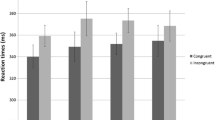Abstract
Three cognitive tasks in which performance depends primarily on the rate of cognitive processing were given to 24 male subjects before and after oral doses of methamphetamine (10 mg), diphenhydramine hydrochloride (100 mg), and placebo. Each subject was tested on Monday, Wednesday, and Friday of one week with drug orders balanced across subjects. Compared with placebo and diphenhydramine, methamphetamine increased the rate at which a visual display was scanned for a target stimulus. Methamphetamine affected neither a time-production task nor a divided attention task that required the subject to perform two cognitive tasks in a limited amount of time. This suggests that methamphetamine can increase cognitive processing speed on tasks involving familiar cognitive operations but that an increase is not likely in tasks involving more complicated decision processes. Compared with placebo and methamphetamine, diphenhydramine caused subjects no experience geophysical time as passing more slowly, but the drug had no significant effects on the visual search or divided-attention tasks. This suggests that time perception is more likely to be altered by diphenhydramine than is performance on tasks requiring short periods of rapid cognitive processing.
Similar content being viewed by others
References
Broadbent, D. E.: Decision and stress. New York: Academic 1971
Frankenhaeuser, M.: Estimation of time: an experimental study. Stockholm: Almquist and Wiksell 1959
Goldstone, S., Boardman, W. K., Lhamon, W. T.: Effect of quinal barbitone, dextro-amphetamine and placebo on apparent time. Br. J. Psychol. 49, 324–328 (1958)
Griffith, J. D., Cavanaugh, J., Held, J., Oates, J. A.: Dextroamphetamine: evaluation of psychomimetic properties in man. Arch. Gen. Psychiatry 26, 97–100 (1972)
Hollister, L. E., Gillespie, H. K.: Marihuana, ethanol and dextroamphetamine: mood and mental function alterations. Arch. Gen. Psychiatry 23, 199–203 (1970)
Huck, S. W., McLean, R. A.: Using a repeated measures ANOVA to analyze the data from a pretest-posttest design: a potentially confusing task. Psychol. Bull. 82, 511–518 (1975)
Jick, H., Sloan, D., Shapiro, S., Lewis, G. P.: Clinical effects of hypnotics. I. A. controlled trial. J. A. M. A. 209, 2013–2015 (1969)
Kahneman, D.: Attention and effort. Englewood Cliffs: Prentice Hall 1973
Kahneman, D., Beatty, J., Pollack, I.: Perceptual deficit during a mental task. Science 157, 218–219 (1967)
Keele, S. W.: Attention and human performance. Pacific Palisades, Calif: Goodyear 1973
Martin, W. R., Sloan, J. W., Sapiro, J. D., Jasinski, D. R.: Physiologic, subjective, and behavioral effects of amphetamine, methamphetamine, ephedrine, phenmetrazine, and methylphenidate in man. Clin. Pharmacol. Ther. 12, 245–258 (1971)
Neisser, U.: Visual search. Sci. Am. 210, 94–102 (1964)
Pachella, R. G.: The interpretation of reaction time in information processing research. In: Human information processing: tutorials in performance and cognition, B. Kantowitz, ed. New York: Earlbaum 1974
Scheffe, H.: The analysis of variance. New York: Wiley 1959
Shapiro, S., Sloan, D., Lewis, G. P., Jick, H.: Clinical effects of hypnotics. II. An epidemiologic study. J. A. M. A. 209, 2016–2020 (1969)
Sternberg, S.: The discovery of processing stages: extensions of Donders' method. In: Attention and performance II, W. G. Koster, ed. Amsterdam: North-Holland 1969
Talland, G. A., Quarton, G. C.: The effects of drugs and familiarity on performance in continuous visual search. J. Nerv. Ment. Dis. 143, 266–274 (1966)
Tinklenberg, J. R., Kopell, B. S., Melges, F. T., Hollister, L. E., Marihuana and alcohol: time production and memory functions. Arch. Gen. Psychiatry 27, 812–815 (1972)
Tinklenberg, J. R., Roth, W. T., Kopell, B. S.: Marijuana and ethanol: differential effects on time perception, heart rate, and subjective response. Psychopharmacology 49, 275–279 (1976)
Weiss, B., Laties, V. G.: Enhancement of human performance by caffeine and the amphetamines. Pharmacol. Rev. 14, 1–37 (1962)
Author information
Authors and Affiliations
Rights and permissions
About this article
Cite this article
Mohs, R.C., Tinklenberg, J.R., Roth, W.T. et al. Methamphetamine and diphenhydramine effects on the rate of cognitive processing. Psychopharmacology 59, 13–19 (1978). https://doi.org/10.1007/BF00428024
Received:
Accepted:
Issue Date:
DOI: https://doi.org/10.1007/BF00428024




